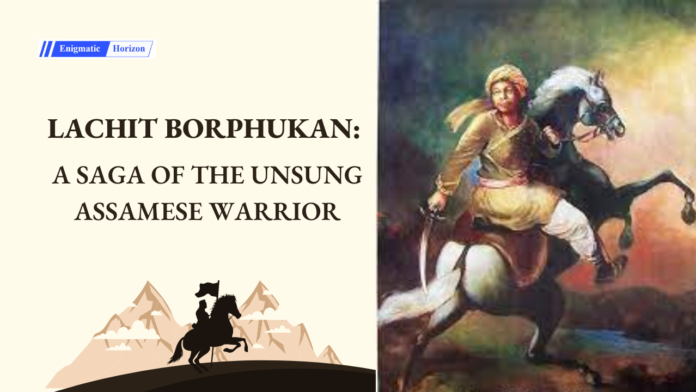Priyal Dholakia – Enigmatic Horizon Staff (Assistant Editor)
“Dexot koi Momai Dangor Nohoi.” (My uncle is not more important than my own country).
These words continue to echo in the heart of Assam’s culture and legacy to this day.
This clarion call, given by Lachit Borphukan, is nothing short of historic. Borphukan was a heroic Ahom commander who beat the Mughals in the Battle of Saraighat. He made this rallying cry when he beheaded his uncle for his betrayal during the fight against the Mughal forces. His brave acts continue to inspire scores of generations, even today, to uphold the glory of India.
There are tales of victory in every state or community. In Assam’s history, the tale of Lachit Borphukan is one such tale of pride and patriotism. Let us learn more about this unsung hero who epitomized bravery and triumph in India’s history.
Lachit Borphukan remains one of the most valiant warriors in the history of India. He displayed a sheer show of courage by crushing the entire Mughal army to a mortifying defeat. This Battle of Saraighat took place in 1671 under the command of General Ramsingha. At that time, Assam, or the Ahom Kingdom, was enjoying the reign of the Ahom King, Chakradhwaj Singh. The Mughal emperor, Aurangzeb, then sent orders to lay siege and capture Assam. The Mughals would have been on the verge of capturing Assam had it not been for the valor of Lachit Borphukan.
The day before the battle, he created a huge sand barrier to obstruct the roads. He did it on purpose so that the Mughals would be forced to march via the canals of the river Brahmaputra. Borphukan had delegated the duty to his maternal uncle so that the task could be finished in one night. In spite of this, his uncle somehow neglected his duties. Borphukan found his uncle and men deep asleep, leaving their tasks unfinished. This shook and angered him to the core. He at once drew his sword and killed his uncle in the pursuit of preserving his nation.
Moreover, during this decisive battle, Borphukhan was suffering from severe attacks of fever. He was in a morbid and half-conscious state. Seeing their leader in such a state, the soldiers started to lose their zeal and confidence. But Borphukan did not want his soldiers to dampen their spirits. He ordered his fellowman, “Mount my bed on the boat; I will fight till the end of my life.” He fought, and his valiant efforts prevented the Mughals from capturing Assam. But because of his ill health, he passed away shortly after the battle ended.
This incident has immortalized him in the history of Assam. Although he is not well-known in other parts of India, people across Assam worship him as a brave son of Assam. Without Borphukan’s courage, Guwahati would have been annexed under tyrannic Mughal rule. With his timely dutifulness, he succeeded in upholding the freedom of his motherland. No wonder Borphukan has become a symbol of Assamese patriotism. Every year on November 24, Lachit Divas is commemorated to honor his iconic heroism. There are a lot of structures and landmarks built in Assam in his memory. Last year marked the 400th birth anniversary of Lachit Borphukan. It was celebrated with great vigor across the state of Assam.
Assamese history cannot be complete without the name of Lachit Borphukan. As a warrior of warriors, he will always hold a special place in the pages of time. The story of Barphukan is the story of standing strong in the face of all odds. It is a story of success, sacrifice, and steadfastness. His spirit of patriotism will keep resonating through the walls of Indian history. And his sacrifices will live on in the hearts of the people of Assam and across India. He will always remain a true hero in Assam history.
We need such a rightful representation of perspective and purpose in today’s time as well. If we wish to have a golden future, then it is very important for us to be proud of our history as well. We should revere and laud the lives of such forgotten heroes. so that the true values of India can continue to inspire, educate, and guide future generations and prevent the fading of Indian history over time.
